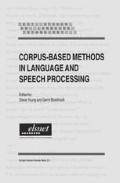Abstract
The dream of having computers able to sustain free conversations with humans has begun to become a reality in the last few years, when, thanks to significant advances in the fields of speech and language processing and to the advent of fast processing machinery, the first working prototypes of spoken dialogue systems have been built. More recently, we are now seeing these systems being further developed into real applications. The system we are referring to in this chapter have a number of common features:
-
1.
They work within a limited semantic domain (e.g. database inquiry about a specific subject);
-
2.
They have a limited vocabulary (of the order of 1000 words), which is sufficient to support essential dialogues in these domains;
-
3.
They are designed to work for the general public rather than for trained users. In particular, we refer to systems developed for use on the public service telephone network (PSTN) by casual, ‘naive’ users (as opposed to regular, ‘experienced’ users). Consequently they have to deal with so called ‘spontaneous speech’ (continuous speech, irregular sentences, ungrammaticalities, extralinguistic phenomena, etc.);
-
4.
Freedom of dialogue is limited and the control is taken by the machine whenever problems of understanding occur.
Access this chapter
Tax calculation will be finalised at checkout
Purchases are for personal use only
Preview
Unable to display preview. Download preview PDF.
Notes
However, caller may also introduce unmarked topic shifts; for example, when the caller talks to someone other than the agent.
Meta-level conceptual descriptions are interpreted by the dialogue module.
Since each SUNDIAL system only operates in one task domain — it cannot offer both flight and train information for example — the task concept can be instantiated at system initialization.
Task parameters were not checked incrementally due to the assumption that checking a remote database would be too time-consuming.
Discrete parameters can also be relaxed; for example, the goalairport parameter can be relaxed when the user wants a flight to London Heathrow, since London has more than one airport. It is not clear from corpus studies however, whether users expect, or would tolerate, this type of behaviour from a computer system.
A similar approach applies to pragmatic status reports.
Editor information
Editors and Affiliations
Rights and permissions
Copyright information
© 1997 Springer Science+Business Media Dordrecht
About this chapter
Cite this chapter
Giachin, E., McGlashan, S. (1997). Spoken Language Dialogue Systems. In: Young, S., Bloothooft, G. (eds) Corpus-Based Methods in Language and Speech Processing. Text, Speech and Language Technology, vol 2. Springer, Dordrecht. https://doi.org/10.1007/978-94-017-1183-8_3
Download citation
DOI: https://doi.org/10.1007/978-94-017-1183-8_3
Publisher Name: Springer, Dordrecht
Print ISBN: 978-90-481-4813-4
Online ISBN: 978-94-017-1183-8
eBook Packages: Springer Book Archive

